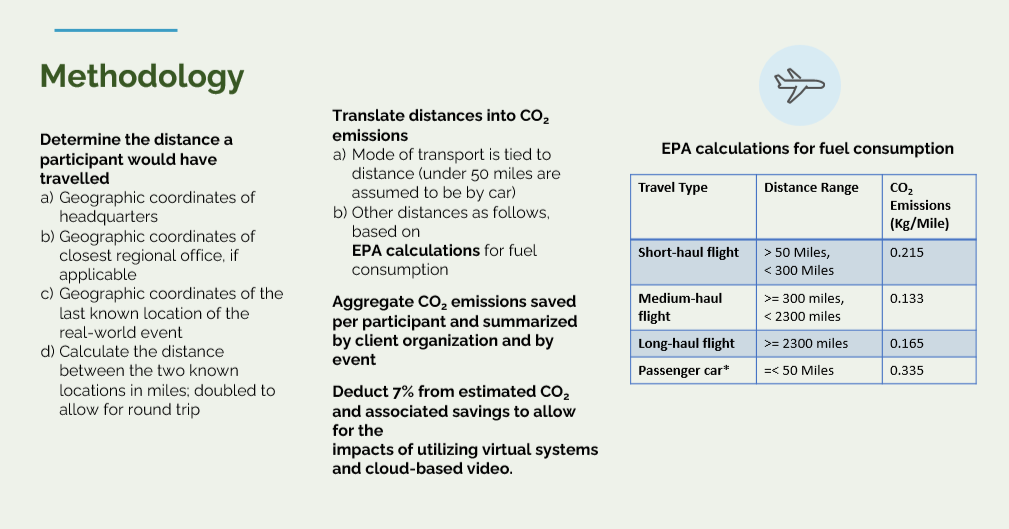At OpenExchange, we are often asked about the impact virtual meetings have on carbon emissions and the health of the planet. So we analyzed a mountain of data from 14 large conferences we executed for our top 5 clients between 2020-2021, and with some conservative assumptions, concluded that nearly 30 million air miles were saved – representing 5,000 metric tons of CO2 apiece and crucial reductions in greenhouse gases like nitrogen dioxide & methane. Overall, we now know that carbon emissions can be reduced by 90% when an event is hosted virtually.
Moreover, our top-ten clients have made a public declaration regarding their environmental goals via the non-profit CDP organization (formally Carbon Disclosure Project), with many committing to be net-zero by 2030.
What benefit is there in providing precisely calculated emissions savings to event organizers, and even to individual attendees? This initiative is designed to answer that question.
Using peer-reviewed third-party research, science-backed methodology, and recognized government conversion factors – we’ve developed a secure global emissions tracker (GET) to measure and report crucial Scope 3 emissions savings data. The data is most precise when attendees provide their locations (specific attendee data is not shared or disclosed at all times).
The tracker’s results are calculated using the following formula and methodology. You’ll also find links to our references and citations.
We’d love your feedback – please scroll down to the form below.
Formula
(2d*c)+(h*t)=S
d = distance between participants and venues (using geographic coordinates) in miles
c = Kg CO2 savings per mile (provided by the EPA)
h = Kg CO2 savings per night stay in the hotel (Cornell Study)
t = Duration of the conference in days
S = total savings in Kg of CO2

References & Citations
EPA
Center for Corporate Climate Leadership – GHG Inventory Development Process and Guidance
https://www.epa.gov/climateleadership/ghg-inventory-development-process-and-guidance
Carbon Disclosure Project
Earth Day and New Research on How Virtual Impacts the Race to 2030
Cornell Hotel Sustainability Benchmarking Index (2020)
https://ecommons.cornell.edu/1813/74089
Transport Calculations
Source: EPA Emissions Factor as used by World Resources Institute GHG Emissions Calculation Tool
Flight Calculations
Source: EPA Emissions Factor as used by World Resources Institute GHG Emissions Calculation Tool
Other Values
For additional values and data:
https://carbonfund.org/calculation-methods
Tao, Y., Steckel, D., Klemeš, J.J. et al. Trend towards virtual and hybrid conferences may be an effective climate change mitigation strategy. Nat Commun 12, 7324 (2021). https://doi.org/10.1038/s41467-021-27251-2
Faber Et Al. A framework to estimate emissions from virtual conferences. International Journal of Environmental Studies (2021)
OpenExchange Privacy Policy
https://www.openexc.com/privacy-policy/
Please provide any comments or feedback in the form below and click SUBMIT. There are no required fields, but if you would like us to contact you, please provide your email address. As always, any information you submit is strictly confidential and is never shared or sold.
At OpenExchange, we are often asked about the impact virtual meetings have on carbon emissions and the health of the planet. So we analyzed a mountain of data from 14 large conferences we executed for our top 5 clients between 2020-2021, and with some conservative assumptions, concluded that nearly 30 million air miles were saved – representing 5,000 metric tons of CO2 apiece and crucial reductions in greenhouse gases like nitrogen dioxide & methane. Overall, we now know that carbon emissions can be reduced by 90% when an event is hosted virtually.
Moreover, our top-ten clients have made a public declaration regarding their environmental goals via the non-profit CDP organization (formally Carbon Disclosure Project), with many committing to be net-zero by 2030.
What benefit is there in providing precisely calculated emissions savings to event organizers, and even to individual attendees? This initiative is designed to answer that question.
Using peer-reviewed third-party research, science-backed methodology, and recognized government conversion factors – we’ve developed a secure global emissions tracker (GET) to measure and report crucial Scope 3 emissions savings data. The data is most precise when attendees provide their locations (specific attendee data is not shared or disclosed at all times).
The tracker’s results are calculated using the following formula and methodology. You’ll also find links to our references and citations.
We’d love your feedback – please scroll down to the form below.
Formula
(2d*c)+(h*t)=S
d = distance between participants and venues (using geographic coordinates) in miles
c = Kg CO2 savings per mile (provided by the EPA)
h = Kg CO2 savings per night stay in the hotel (Cornell Study)
t = Duration of the conference in days
S = total savings in Kg of CO2

References & Citations
EPA
Center for Corporate Climate Leadership – GHG Inventory Development Process and Guidance
https://www.epa.gov/climateleadership/ghg-inventory-development-process-and-guidance
Carbon Disclosure Project
Earth Day and New Research on How Virtual Impacts the Race to 2030
Cornell Hotel Sustainability Benchmarking Index (2020)
https://ecommons.cornell.edu/1813/74089
Transport Calculations
Source: EPA Emissions Factor as used by World Resources Institute GHG Emissions Calculation Tool
Flight Calculations
Source: EPA Emissions Factor as used by World Resources Institute GHG Emissions Calculation Tool
Other Values
For additional values and data:
https://carbonfund.org/calculation-methods
Tao, Y., Steckel, D., Klemeš, J.J. et al. Trend towards virtual and hybrid conferences may be an effective climate change mitigation strategy. Nat Commun 12, 7324 (2021). https://doi.org/10.1038/s41467-021-27251-2
Faber Et Al. A framework to estimate emissions from virtual conferences. International Journal of Environmental Studies (2021)
OpenExchange Privacy Policy
https://www.openexc.com/privacy-policy/
Please provide any comments or feedback in the form below and click SUBMIT. There are no required fields, but if you would like us to contact you, please provide your email address. As always, any information you submit is strictly confidential and is never shared or sold.